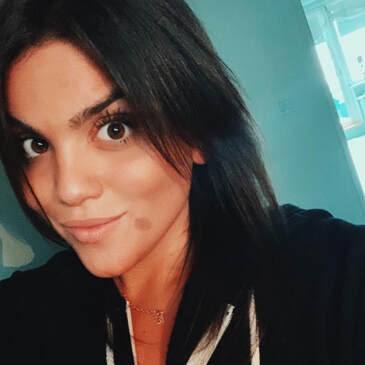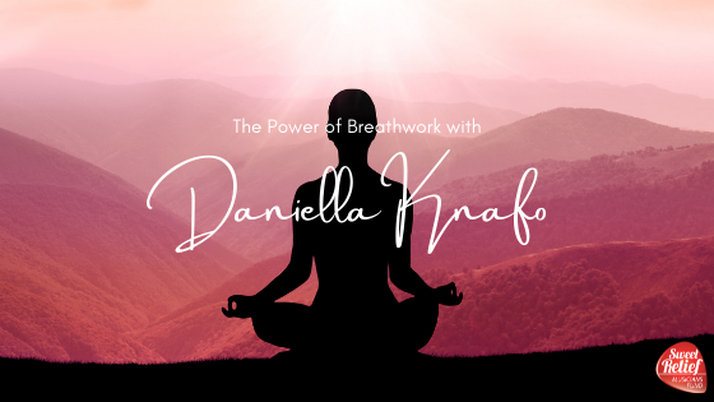|
By: Jackie Paolino (Sweet Relief Intern) This interview and resource does not constitute an endorsement or an approval by Sweet Relief Musicians Fund of any of the products, services or opinions of the corporation or organization or individual. Sweet Relief Musicians Fund bears no responsibility for the accuracy, legality or content of the information below. Please talk to a therapist or doctor before engaging in breathwork. The practice of breathwork, a term for controlled breathing said to have beneficial physical and emotional results, has regained popularity as of late. There are different kinds of breathwork from all over the world, found in different religious practices and different cultures. Holotropic breathwork is one style that was developed in the 1970’s by psychiatrists Stanislav and Christina Grof to achieve altered states of consciousness (without using drugs) as a potential therapeutic tool. I recently got to chat with Daniella Knafo, a Los Angeles based holotropic breathwork facilitator, about the practice and her experience with it.  JP: Tell me a little about you and how breathwork has become a part of your life DK: My name is Daniella. I am 26 years old and I was introduced to breathwork at a random event that I attended. Someone did a quick 10-15 minute breathwork session which consisted of very quick, fast and deep breathing exercises.It was really interesting but I felt like I didn’t get the full effect of it because it was so quick, but I was intrigued to learn more. Later on, I was invited to a different event where I learned more of the holotropic style, which is a three part breathing technique, all done through the mouth, and I quickly fell in love with it for a number of reasons. It definitely helped with my anxiety and stress, and I would leave every session feeling light and good, even when maybe some not so good things would come up for me, I would leave the session feeling really fulfilled and much clearer headed. So I started going to classes pretty frequently. Sometimes one time a week, sometimes 3-4 times a week. It really just depended on how I was feeling. And then the opportunity to become a facilitator was presented to me. One of my favorite teachers didn’t really ask me if I wanted to do it, it was more like “you’re doing it”. And I did, and then I started teaching my own classes. I was taught a certain way of teaching breathwork, and I slowly created my own version of the practice around what I have learned and what I have found to be most effective. JP: How long have you been teaching breathwork? DK: I have been teaching it, or facilitating it rather, for almost two years JP: So you mentioned things “coming up” for you. Could you elaborate on that a little more? DK: Breathwork is a very generic term, because there are many different styles of breathwork that you can do. It can be anything from a quick two minute breathing exercise that you do yourself, to holotropic breathwork, which is closer to what I facilitate, where you dedicate an hour and a half or so to focussing in and having deep conscious breathing, which leads into a meditation portion. So what you are actually doing in this deep three part breath, is you are shutting off the prefrontal cortex of your brain, which sounds like a lot, but what you are actually doing is shutting off the part of the brain where guilt, fear, judgement, lack and all those negative feelings and emotions live. It therefore allows you to get into that meditative state easier and quicker so that you can really go wherever you should go. So the things that might “come up” for you, and it's different for everyone and different every time you do it, but a lot of the time trauma can come up. Past traumas or current situations that you are dealing with that have been really stressful or overwhelming or could be anxiety inducing. So it can be a number of things that could come up. It could be deep rooted traumas from a young age, it could be current situations that you need more clarity on, it could also just be a feeling of euphoria that comes from it, just feeling very light and free. A lot of the time it sparks a lot of creativity and gives you these “a-ha” moments of “this is what I should be doing!” So it really is whatever energy you are coming into the practice with usually guides you into where you are ready to go or where you need to go in that session. JP: So it's tripping without the drugs. DK: It is getting high on your own supply. JP: How can breathwork be beneficial to artists and musicians? DK: I think that breathwork can definitely be not only in the mental health space, but with regard to breath control and singing. JP: So in terms of health benefits, could you elaborate a little more? DK: A big part addresses anxiety and depression, but it also alkalizes your pH balances in your body, and you are over oxygenating your body in the process. There are physical benefits you get from it too. I wouldn’t say it's a “cure” for anything, but with it comes a lot of healing. I’ve done sessions where I’ve had really bad heel pain after breaking my foot, so I focussed on this in several sessions to get rid of the chronic pain in my foot, and the pain has gone away without doing any other kinds of healing. I know people who have lost weight through intentional breathwork practice. It doesn’t make you lose weight, but it releases tension and this energy that you could be holding onto, which is putting weight onto your body. Whereas you start doing these things and breathing consciously, and let go of unnecessary energy and weight you might be holding onto in a spiritual sense, that it starts to reflect in your body as well. A big part of it is about helping to manage anxiety and depression, really clearing your mind and allowing your mind to go into a state where you aren’t constantly “on”. So many of us are constantly in our heads and the average person has somewhere between six and seven thousand thoughts a day. Breathwork allows you to turn your mind off so you aren’t constantly in that state of thinking about all of the things you have to do or get done. It allows you to get to a place where you can just be, and be very present. JP: How often do you practice breathwork? DK: I do a session myself at least once a week. Sometimes I do it more. Sometimes I won’t do as long of a session. I won’t do the full hour and a half, but I will do at least some sort of intentional breathing style every single day. JP: Where can people find a breathwork class? Are there apps, or is it better to work with a facilitator? DK: there is a great app that was developed by my friend Max Gomez called “Breathwrk”. There are many different styles of breathing patterns for different things- for energizing, for relaxation, for calming the mind, for anxiety, for whatever it is you are looking to manage, you can find a breathing pattern guide there. These are much smaller snippets of time, you can do a minute, or ten minutes, but these are great for every day self guided breathwork sessions. If you are looking for something a little more intensive with a more profound experience, unplugged meditation offers breathwork classes, and more and more meditation and yoga studios are starting to adopt breathwork classes as a healing practice. Its newer to the self help, wellness and meditation market, but it is becoming more and more relevant and practiced in these communities. There are also individual facilitators like myself who offer classes both in person and online. The majority of the time it is word of mouth to find your facilitator. But that said, google will definitely help you find what you are looking for. JP: So you offer classes. Tell us about your classes and how people can find them. DK: Yes. A silver lining to COVID was that I started doing a lot of virtual classes through zoom, which is interesting because there is a difference for me as a facilitator. I do prefer an in person setting with my clients. I like to see what is happening with the body, where their energy is being held so I can do bodywork on them at the same time as the breathing is happening. That said, I have many virtual clients who still get such an impactful experience where you are in your own space and your own environment, where you can put your headphones in and do the breathwork session in your own home or wherever it is that you may be. There are definitely ways to access it from where you are. JP: How important is the music component to breathwork? DK: I would say it's very important in my opinion. My playlists that I create for each class are different. I usually start it with a relaxing guided song that gets people into a calming energy so they can do a body scan, and then having faster music to follow the breath pattern where they push the breath a little harder with songs that get you in the zone. Tribal music with drums is great for connecting the breath to the rhythm and vibration of self to get you to that meditative state. With the meditation part, it's good to use songs that aren’t going to take someone out of that state of mind, so usually something with not too many words, or just a simple mantra or a different language to help keep the mind in that space and not thinking too much, but also allows them to just float away. JP: Who has been an artist you look to in creating these playlists? DK: I have been listening to Island Man. It's incredible, very tribal with drums, flutes, and the style of the music is very appropriate for this kind of practice. When I am looking for new songs or new artists, I just go to the ones I know on spotify and look at the artists radios on spotify to discover new music that is similar. I listen through and test it out before the class setting. With the meditation portion, I love artists like Deuter or Satnam Guru or spiritual types of artists that can help get you into a state of calmness and peace. JP: Is breathwork good for everyone? Should anyone avoid it? DK: For the most part breathwork is safe for everyone. There are certain restrictions, like if you are pregnant, you should talk to your doctor because it could induce labor, but it's generally fine to do it early in a pregnancy. The type of breathwork that I do, which is a bit more intense, is not good for late stage pregnancies. Also it might not be good for people who are prone to seizures or who are prone to epilepsy. Any type of neurological condition where overextending yourself with your breath could be detrimental to your health condition, it is probably best to air on the side of caution. I would say talk to your doctor about it if you have any doubts or if you have any kind of neurological condition. Be honest with your teacher and while they are not doctors, they can usually help you make a decision, but start with your doctor. JP: Where can people find you? DK: I can be reached on IG @breathewithdk or [email protected] and I offer in person beach classes in the LA area. Reach out! I also offer virtual and private classes. Comments are closed.
|
News ListArchives
July 2024
|
|
|
CONTACT US:
Sweet Relief Musicians Fund 2650 E Imperial Hwy Ste 208 Brea, CA 92821-6135 Tel. 714-626-0447 Fax 714-626-0473 Toll Free Assistance line 888-955-7880 |
Sweet Relief Musicians Fund is a 501(c)3 non-profit charity. Federal ID# 95-4443269
© Sweet Relief. All rights reserved 2024.


 RSS Feed
RSS Feed
